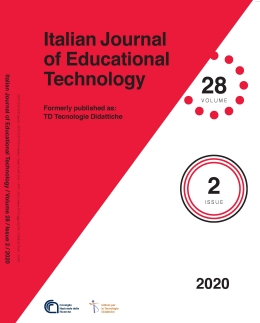Innovazione nella formazione iniziale degli insegnanti
Contenuto principale dell'articolo
Abstract
[...] We wanted to gather colleagues who have tested new methods and strategies that allow prospective teachers to face the current global challenges. However, our attention is not only focused simply on “how” technologies allow us to identify new perspectives but also on “why” we must multiply our efforts to give the teachers of future generations more intellectual and technical solutions in order to develop new meaningful learning environments. Innovation in teacher education means creating educational paths, where trainee teachers feel they are becoming part of a historical process in which past and present are continuously interwoven (Gadamer, 1979). In several teacher education institutions around the globe, digital innovations are supporting the education of future teachers. [...]
Dettagli dell'articolo
Sezione
Gli autori che pubblicano su questa rivista accettano le seguenti condizioni:
- Gli autori mantengono i diritti sulla loro opera e cedono alla rivista il diritto di prima pubblicazione dell'opera, contemporaneamente licenziata sotto una Licenza Creative Commons CC BY 4.0 Attribution 4.0 International License.
- Gli autori possono aderire ad altri accordi di licenza non esclusiva per la distribuzione della versione dell'opera pubblicata (es. depositarla in un archivio istituzionale o pubblicarla in una monografia), a patto di indicare che la prima pubblicazione è avvenuta su questa rivista.
- Gli autori possono diffondere la loro opera online (es. in repository istituzionali o nel loro sito web) prima e durante il processo di submission, poiché può portare a scambi produttivi e aumentare le citazioni dell'opera pubblicata (Vedi The effect of Open Access).
Riferimenti bibliografici
Gehlen, A. (1988). Man, his nature and place in the world. New York: Columbia University Press.
Giri, A. K., & Clammer, J. R. (2014). Philosophy and anthropology: border crossing and transformations. London: Anthem Press.
Koops, M., & Hoevenaars, M. (2013). Conceptual change during a serious game: Using a Lemniscate model to compare strategies in a physics game. Simulation & Gaming, 44(4), 544-561.
Molnár, G., & Szüts, Z. (2018, September). The Role of Chatbots in Formal Education. In 2018 IEEE 16th International Symposium on Intelligent Systems and Informatics (SISY) (pp. 000197-000202). IEEE.
Turing, A. M. (1950). Computing Machinery and Intelligence. Mind 49: 433-460.
Van Ginkel, S., Gulikers, J., Biemans, H., Noroozi, O., Roozen, M., Bos, T., Van Tilborg, R., Van Halteren, M., & Mulder, M. (2019). Fostering oral presentation competence through a virtual reality-based task for delivering feedback. Computers & Education, 134, 78-97. https://doi.org/10.1016/j.compedu.2019.02.006
Van Ginkel, S., Ruiz, D., Mononen, A., Karaman, C., de Keijzer, A., & Sitthiworachart, J. (2020). The impact of computer‐mediated immediate feedback on developing oral presentation skills: An exploratory study in virtual reality. Journal of Computer Assisted Learning, 36(3), 412-422. doi/full/10.1111/jcal

